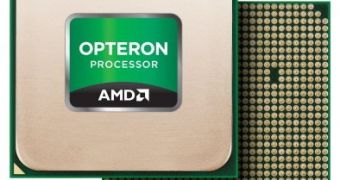Five months after the introduction of the Opteron 6200 and Opteron 4200 processors, AMD is expanding its lineup of server chips based on the Bulldozer architecture with the launch of the single-socket Opteron 3200 series CPUs.
Right now, the Opteron 3200 processor range consists of three SKUs, namely the Opteron 3250, 3260, and 3280.
The first two of these feature dual Bulldozer modules for a total of four processing cores and their clock speeds are set at 2.4GHz and 2.7GHz (2.7GHz and 3GHz maximum Turbo), respectively.
The third chip introduced by AMD today packs eight computing cores with a base clock speed of 2.5GHz and 2.8GHz maximum Turbo. Its TDP is rated at 65 Watts, while the quad-core Opteron 3200 series CPUs fit inside a 45W power envelope.
Compared to their desktop counterparts, these three Opteron processors are validated for being used inside servers and come with an improved memory controller that supports up to 32GB of dual-channel ECC RAM running at speeds of up to 1866MHz.
The Opteron 3200 series targets the dense, power efficient 1P Web hosting/Web server market.
"In today's economic environment, dedicated hosting providers need their data centers to become profit centers faster than ever," said Patrick Patla, corporate vice president and general manager, commercial business, AMD.
"With the new AMD Opteron 3000 Series platform, Web and Cloud customers no longer have to compromise with desktop-class platforms in order to hit certain price points.
“Now they have all the benefits of a true server-class product at desktop-class price points. This helps rapidly-growing hosting customers achieve fast payback in their incredibly dense, power-efficient environments," concluded the company’s rep.
Pricing for the Opteron 3250, 3260, and 3280 CPUs is set at $99, $125, and $229 (75, 94.5 and 173 EUR), respectively. All the chips are shipping right now and are available in platforms from MSI, Tyan, Fujitsu and Dell.

 14 DAY TRIAL //
14 DAY TRIAL //